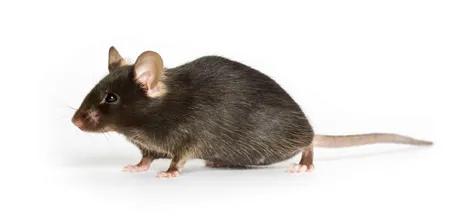Lipoteichoic acid (LTA), a gut bacterial protein, contributes to colitis in mouse models of IBD
March 8, 2011We rarely think about them, but we can't live without them – the bacteria in our gastrointestinal tracts. Unfortunately, some of us have developed allergies to them. Indeed, mounting evidence indicates that inflammatory bowel disease (IBD) is such an allergy – an autoimmune response to normally beneficial bacteria. Recently, a research team from Northwestern University Feinberg School of Medicine, Chicago, Illinois, demonstrated that deleting a cell wall protein from a certain species of gut bacteria not only prevents but mitigates IBD in mice (Mohamadzadeh et al. 2011).
Inflammatory bowel disease
IBD is a complex heterogeneous group of autoimmune disorders caused by an imbalance among normally beneficial gut bacteria, gut epithelia and immune responses (Beckwith et al. 2005). The more common symptoms include abdominal pain, diarrhea, rectal bleeding, vomiting and weight loss. The two most common forms of IBD are Crohn's disease and ulcerative colitis. Though IBD occurs worldwide, it is most common in the United States, United Kingdom and Scandinavia (Hendrickson et al. 2002). Several inflammatory cytokines, notably interleukin 12 (IL12), IL23 and IL10, are major regulators of its pathogenesis: whereas IL12 and IL23 induce inflammation, IL10 suppresses it.
Lactobacilli and lipoteichoic acid
The gastrointestinal tract is home to many beneficial microorganisms, including a group of Gram-positive bacteria known as lactobacilli. The Northwestern University research team and others had found that some lactobacilli stimulate intestinal dendritic cells to produce IL12 and IL10. Evidence suggested that the dendritic cells are stimulated to produce these cytokines when bacterial surface molecules, including lipoteichoic acid (LTA), bind to receptors, such as Toll-like receptor 2 (TLR2), on their cell surfaces. To test this hypothesis, the researchers compared the effects of an LTA-deficient mutant ofLactobacillus acidophilus, a common lactobacillus in the gut, to those of its wild-type counterpart in cell cultures and mouse models of IBD.
In vitro evidence that LTA mediates IBD
The researchers found that LTA elicits a strong inflammatory reaction that is controlled by intestinal dendritic cells. Unlike their wild-type counterparts, LTA-deficientL. acidophili downregulate pro-inflammatory factors (such as MHC II, CD40, CD80, and CD86) and do not induce TLR2 transcription in cultured intestinal dendritic cells. The LTA-deficient bacteria also suppress the production of tumor necrosis factor alpha (TNFA) and IL12 and increase the production of IL10 in cultured bone marrow dendritic cells derived from C57BL/6J (000664, B6) and BALB/cJ (000651) mice. Additionally, they suppress the proliferation of cultured T cells and reduce the production of interferon gamma (IFNG), IL2, and TNFA but increase the production of IL10 from these cells. In other words, in contrast to their wild-type counterparts, LTA-deficientL. acidophili suppress inflammatory responses in cultured mouse dendritic cells.
LTA acts via TLR2/MYD88 signaling
A hallmark of IBD and other inflammatory diseases is an increased production of TNFA, which can be upregulated when TLR2 activates the intracellular messenger MYD88. The research team found that LTA-deficientL. acidophili only weakly enhance TNFA production in cultured bone marrow dendritic cells derived from wild-type B6 and BALB/cJ mice. Significantly, wild-type bacterial LTA does not enhance TNFA production in cultured cells from either TLR2-deficient B6.129-Tlr2tm1Kir/J (004650) or MYD88-deficient CBy.129P2(B6)-Myd88tm1Defr/J mice (009108). Thus, the researchers concluded that LTA induces dendritic cells to produce TNFA via TLR2/MYD88 signaling, suggesting a possible mechanism behind some of the symptoms seen in IBD patients.
In vivo evidence that LTA mediates IBD

The research team found that LTA-deficient L. acidophili mitigate colitis in live mice. Unlike their wild-type counterparts, LTA-deficient L. acidophili slow the development of colitis in a commonly used mouse model in which colitis is induced by dextran sulfate sodium (DSS). Furthermore, mice that already have colitis improve after they are administered LTA-deficient L. acidophili.
The LTA-deficient bacteria induce an anti-inflammatory response by increasing IL10 production and preventing increases of IL12, IL6, IFNG, and TNFA production in the colons of these mice. Unlike wild-typeL. acidophili, LTA-deficient L. acidophili do not induce the expression of a host of genes (including genes related to immune signaling, proliferation, apoptosis, angiogenesis and adhesion) implicated in IBD responses. Additionally, they substantially mitigate the development of colitis in Rag1-deficient (T cell-deficient) B6.129S7-Rag1tm1Mom/J mice (002216) inoculated with pathogenic, colitis-inducing CD4+CD45RBhigh T cells.
Regulatory T cells and IL10 suppress IBD
CD4+ T regulatory cells (Tregs) were known to suppress autoimmune responses or immune responses to commensal microbiota. The Northwestern University researchers found that Tregs likely play this kind of role in DSS- or CD4+CD45RBhigh T cell-induced colitis: LTA-deficient L. acidophili induce colonic Tregs in B6 mice significantly more than do their wild-type counterparts, and their inflammation-curbing properties are suppressed in mice whose Tregs are inactivated. The researchers also found evidence that colonic Tregs produce IL10.
Substantiating the role of IL10 and Tregs in suppressing IBD, they found that LTA-deficientL. acidophili do not prevent chemically-induced colitis in Il10-deficient B6.129S6-Il10tm1Flv/J mice (008379). Furthermore, they demonstrated that a Treg-deficient mouse that is administered CD4+CD45RBhigh T cells is not protected by LTA-deficient L. acidophili.
Taken together, the findings of the Northwestern University research team furthered our understanding of how natural gut bacteria interact with our immune systems and suggested new avenues for treating IBD and other autoimmune diseases.
References
Beckwith J, Cong Y, Sundberg JP, Elson CO, Leiter EH. 2005. Cdcs1, a major colitogenic locus in mice, regulates innate and adaptive immune response to enteric bacterial antigens.Gastroenterology 129:1473-84.
Hendrickson BA, Gokhale R, Cho JH, 2002. Clinical aspects and pathophysiology of inflammatory bowel disease.Clin Microbiol Rev 15:79-94.
Mohamadzadeh M, Pfeiler EA, Brown JB, Zadeh M, Gramarossa M, Managlia E, Bere P, Sarraj B, Khan MW, Pakanati KC, Ansari MJ, O'Flaherty S, Barrett T, Klaenhammer TR. 2011. Microbes and Health Sackler Colloquium: Regulation of induced colonic inflammation byLactobacillus acidophilus deficient in lipoteichoic acid. Proc Natl Acad Sci U S A 108 Suppl 1:4623-30.
